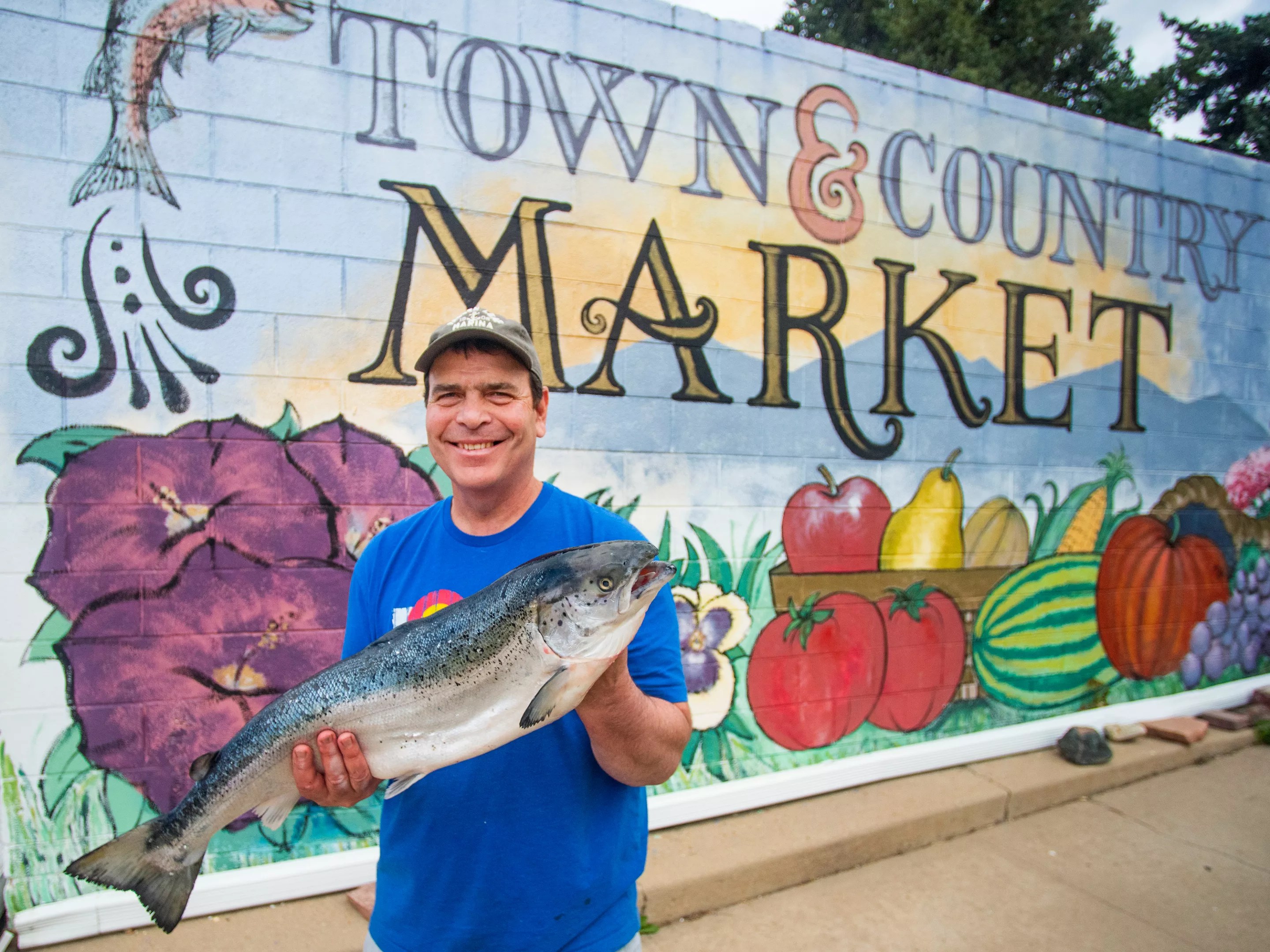
Evan Semón

Audio By Carbonatix
Colfax Avenue is filled with characters of all kinds, and Duffy Fanganello is one of the good ones.
“He’s just a sweetheart of a guy,” says chef Goose Sorensen, who ran Solera, a fine-dining restaurant, on Colfax for sixteen years. “He’s like a Muppet. He’s always got a goofy grin, and it always makes my day when I go in and talk with him.”
Sorensen is one of the regulars at Town & Country Market, a store that’s been at the corner of East Colfax and Bellaire Street since at least 1948. Its history runs deep, and is filled with kegs of 3.2 beer, collard green plant starters and commercial fishing trips in Alaska. And Fanganello is the man who ties them all together.
For Solera’s entire run, and during Sorensen’s time at the long-gone Mel’s and Starfish in Cherry Creek before that, he purchased salmon for the restaurants from Fanganello’s two-in-one business. “It’s kind of a weird spot,” admits Sorensen, an avid fisherman himself. “But you’re supporting a local guy who has been doing this for years, and it’s really great fish.”

Town & Country Market has been serving the community since at least 1948.
Evan Semón
The Fanganello family has deep roots in Denver, too. Duffy’s great-grandparents left Italy and settled here in the early 1900s. His father, Joseph, was raised in the Northside. “He grew up very poor and, through a miracle, made it through all of the trials of life, went to Regis University and the University of Colorado for law school, and became an attorney,” Fanganello says.
His mother, JoAnne, was originally from Kansas City and came to Colorado to attend Loretto Heights College. “All the Regis boys dated the Loretto Heights girls,” Fanganello says. Technically, he was born in his mother’s hometown, but was there “just for a couple of days,” he jokes. “But I can make great barbecue. It’s in the DNA.”
Also in his DNA is a love of food. “My father was always cooking things like fruitti de mar. He just always had a lot of interest in making good food for people,” Fanganello recalls.
He also remembers being taken out to dinner by his grandfather as a kid, when he was introduced to fine dining at Lafitte’s in Larimer Square, in the spot now occupied by Tamayo. “He’d take me out and say, ‘Get whatever you want.’ And I’d say, ‘I’ll take the steak and lobster and escargot and frog legs.’ I was never shy about seafood and always loved seafood,” Fanganello says. “I enjoyed food so much, and knew I was going to be a foodie in some capacity. I just didn’t know what it was.”
He spent his childhood and teen years traversing a Colfax that looked very different from the way it appears today. His first restaurant job was at the Firefly Cafe, in the building that would later become Solera and was most recently home to Street Feud for just under a year. The nearby space that is now the Abbey was a flower shop where he bought his prom corsage; the building across from the Owl Saloon was a photography studio where he got his senior portrait taken; the Green Dragon dispensary was a Dolly Madison ice cream shop.
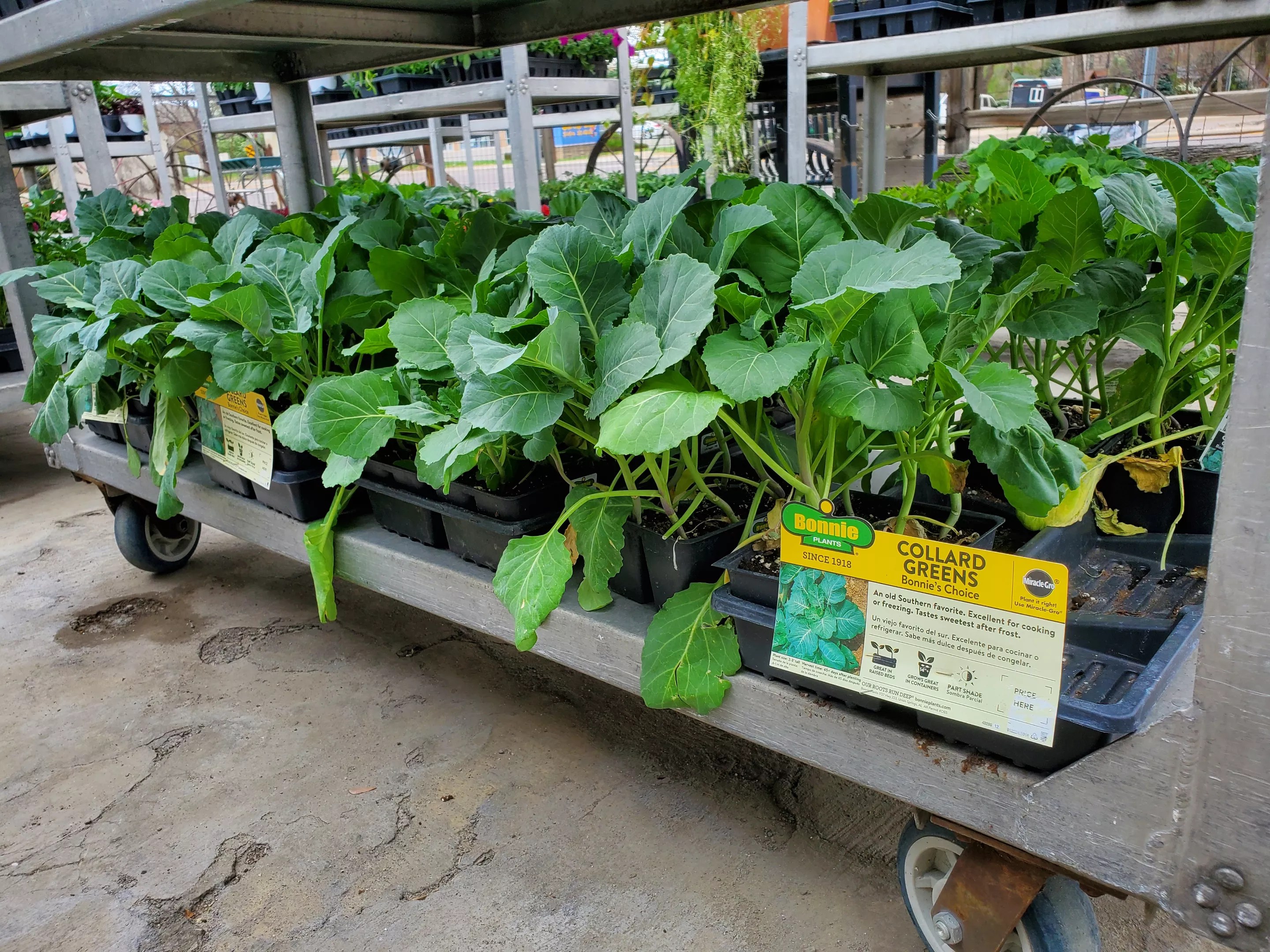
Collard green starters are a staple at Town & Country in the spring and summer.
Molly Martin
He was also a regular at Town & Country. His uncle Leonard had been a soda delivery man in the early ’70s. The store was on his route, and when the owners decided to sell in 1972, Uncle Leonard bought the place. “I would work there as a child, and I would also go there with all of my friends on our bikes and get candy and ice cream and peanuts,” Fanganello recalls, describing the shop as a kind of dollar store that catered to the community.
For decades, Town & Country’s biggest seller was kegs of 3.2 percent ABV beer – at the time, the only booze that could be sold in convenience stores and on Sundays, when liquor stores were closed. “It was big for eighteen- to twenty-year-olds,” Fanganello adds. It was also the only alcohol permitted in nearby City Park.
Plants and flowers have been a longtime staple of Town & Country’s business, too. “City Floral has been around just as long, but that was for the rich white people. Town & Country was for everyone else,” Fanganello says, noting that it became known in the Black community as the place to get collard green starters and among Greek families as the spot to get onion sets.
Town & Country even made an appearance in a video shot on 8mm film by Paul McCartney during a visit to Denver in 1967. In it, the sign out front advertises peat moss for sale. “Maybe Paul ordered it,” Fanganello muses.
In 1985, during summer break between his junior and senior year at East High School, Fanganello and some friends decided to go on an adventure that would change his future, as well as the future of Town & Country.
The group of teens hopped in one of their parents’ cars and headed to Alaska. “When we got into Anchorage, I was able to get a job as a commercial fishing boat crew member on a boat that was in a native Alaskan village of 97 people,” Fanganello recalls. “I went onto a boat that was run by, like, the godfather of the village. He was an elder. He’d fished since his childhood, and he taught me a lot. I was really lucky to be on his boat and to learn so much about the fishing process. And I was a really good fisherman, too. I was young and strong.”

Duffy Fanganello knows must of his customers by name.
Evan Semón
He’d never fished while growing up in Denver, but “when I got the chance to go to Alaska, it fell into my lap – this opportunity, the most delicious thing I’d eaten in my life,” he says. “Also, this interest in the sea and water and the ocean and fish. I like fish.”
And so he went back to Alaska to fish the summer after his senior year. And the next, and the next. “It was kind of like a summer camp,” Fanganello describes. “Fly to Alaska, go to the same village, hang out with the same young kids, and fish. And every year I would bring some fish back and we would have a big barbecue in the fall. All my friends and family would come over, and we’d have a big celebration, a homecoming, and everyone would say, ‘This is the most incredible King salmon that I’ve ever had.”
One year, he decided to ship 500 pounds of fish back to Denver, where he sold it to Wild Oats, a new grocery store in Boulder. The next year, “it was a bunker fishing season,” he recalls. “The bounty of the sea.” So he used the money he’d made to buy boxes and gel packs and, with a go-ahead from the elders in the village, arranged to send even more fish directly to Colorado – 26,000 pounds of it.
“That’s also when I started setting up my uncle’s Town & Country as the place for my guys to receive the fish and have a place to handle it,” he says. “And that was the beginning of Alaskan Salmon Company.”

Fanganello added retail sales for his mom’s book club friends.
Molly Martin
That year and ever since, the wholesale company has sold to a list of restaurants that reads like a roundup of the local culinary scene’s greatest hits, from long-gone places like Theatre Cafe, Mataam Fez, Tante Louise, Normandy, Cliff Young’s, Avenue Grill and Solera – in the building where he’d worked years before – to the still-serving Brown Palace, Barolo and Mizuna.
“What a community you start when you’re just the guys that have fish. We exposed Denver to the wild fresh salmon industry. We were in our early twenties. We didn’t know exactly what we were doing. We didn’t even have scales,” he admits. “We were like, how much do you think it weighs? How much do you want to pay for it? We were pulling it out of the back of a VW Rabbit” – one of many ragtag delivery vehicles that Fanganello has used over the years.
“He’d show up to Mel’s in a Toyota pickup.” Sorensen recalls. “The thing barely ran, but he’d show up with a cooler with fish in it.”
Eventually, “we matured,” Fanganello says, and the business did, too, gaining a lot of loyal wholesale customers along the way. “When you have that much coming in and you’ve eliminated the middle man, your price point is so attractive to everybody. That’s why it’s so popular, because it’s direct, and that’s reflected in the cost. I’ve always liked that part of it – that we can give the fish to people at an affordable price and have it be direct from the source and so fresh. It’s win-win.”
Sorensen agrees. “It’s a really good product, and it’s priced right,” he says. “There are a lot of shysters in the purveyor business. And it’s a hard business – plus you’ve gotta deal with asshole chefs. But Duffy is one of the most jolly, nice human beings I know. If there was ever a problem, he was one of those purveyors that would fix it right away.”
But while Fanganello’s fish company was doing well, Town & Country was struggling. Uncle Leonard, who was an RTD bus driver, hurt his back and was on disability. And business was dwindling. “The neighborhood was not great,” Fanganello notes, and grocery stores had completely taken over that part of the market’s business. “There was no revenue coming in. He needed to sell.”
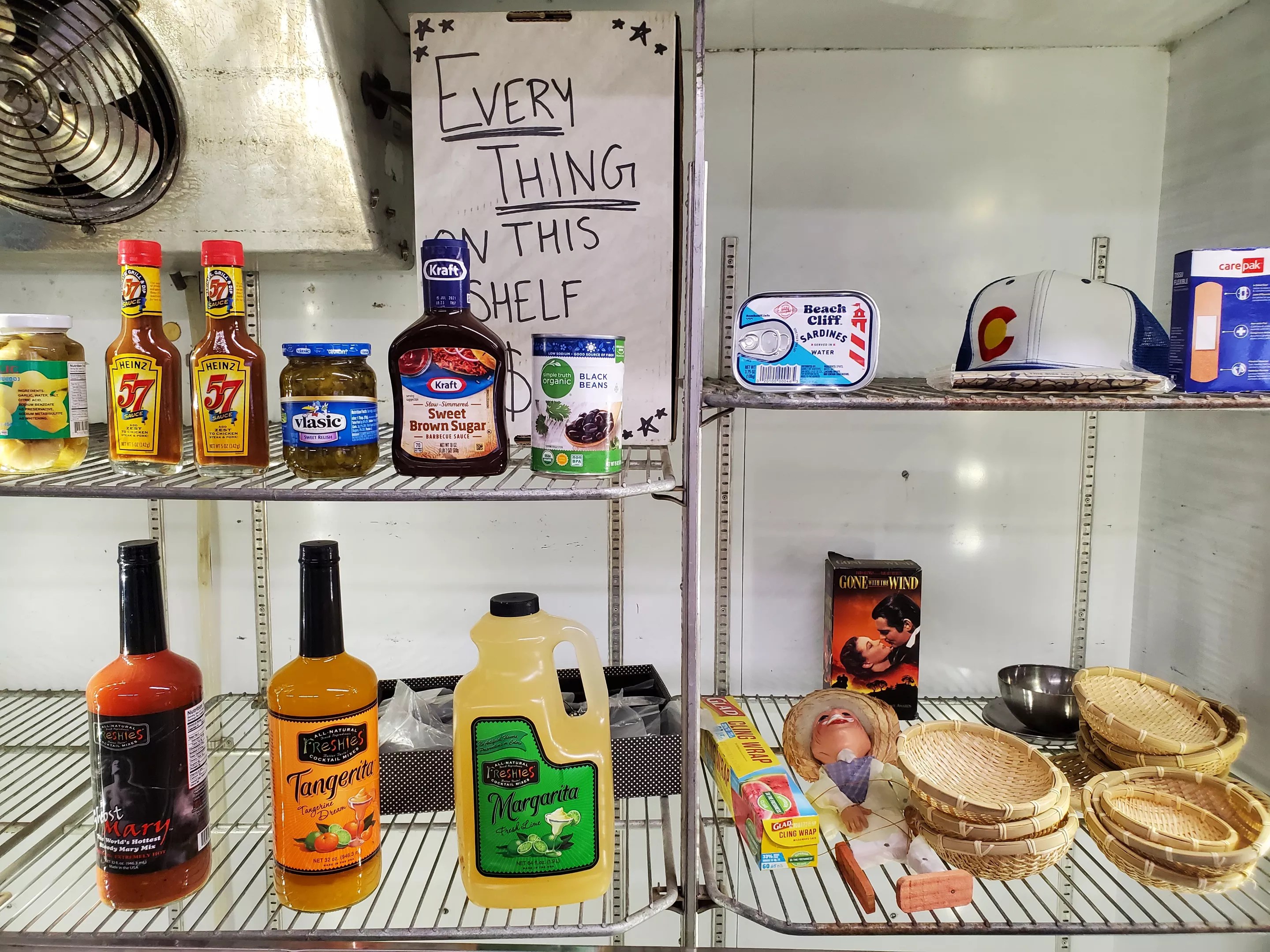
A random collection of items for sale at Town & Country.
Molly Martin
In 2002, Fanganello bought the store.
“I kind of tried to shut it down. You couldn’t go there all winter,” he recalls. “Then the spring came and someone left a note that said, ‘I need collard greens, I’ll be back tomorrow.”’ So the salmon man reluctantly started learning about plants.
“Pretty much, the customers demanded that the market stay open,” he adds.
Customers demanded something else, too. “Mom’s book club friends started coming in and saying, ‘We want a half-pound of fish,'” Fanganello recalls. “I’m used to selling half a ton of fish!” But he couldn’t disappoint his mom’s friends. “Then they told a friend, and they told a friend, and they told a friend…”
Soon, the Alaskan Salmon Company at Town & Country became a go-to for a group of neighborhood insiders. “We have a few thousand people that come in here now that are all linked by six degrees of separation or less,” Fanganello notes.
Over his years as Colfax’s resident fishmonger, Fanganello’s own story has taken many turns. He spent three years in the early ’90s commuting back and forth between Denver and Seattle, where he took fish to Pike Place Market as a commercial fish broker. He once pretended to be a journalist in order to say hello to Governor Roy Romer, his old neighbor and the father of his high school best friend, who was in Seattle with soon-to-be-president Bill Clinton on a campaign stop.
He got married and bought the house directly behind Town & Country. “Always in the village, the house was near the boat. And I wanted the house near the boat,” he says.
As a favor to a friend who was trying to get his footing as a stockbroker, Fanganello invested a small amount of his fish company profits and made enough in the dot.com boom to buy the adjacent corner property.
He and his wife had a daughter, Phoebe, “the fish princess,” he jokes. At the age of forty, he was diagnosed with lymphoma and underwent two years of chemotherapy. He beat cancer, but got divorced – though his ex still lives in the house across the street, and the two, who shared their first kiss at a Halloween party when she was in seventh grade and he was in sixth (and was dressed up as a Girl Scout), remain close friends.
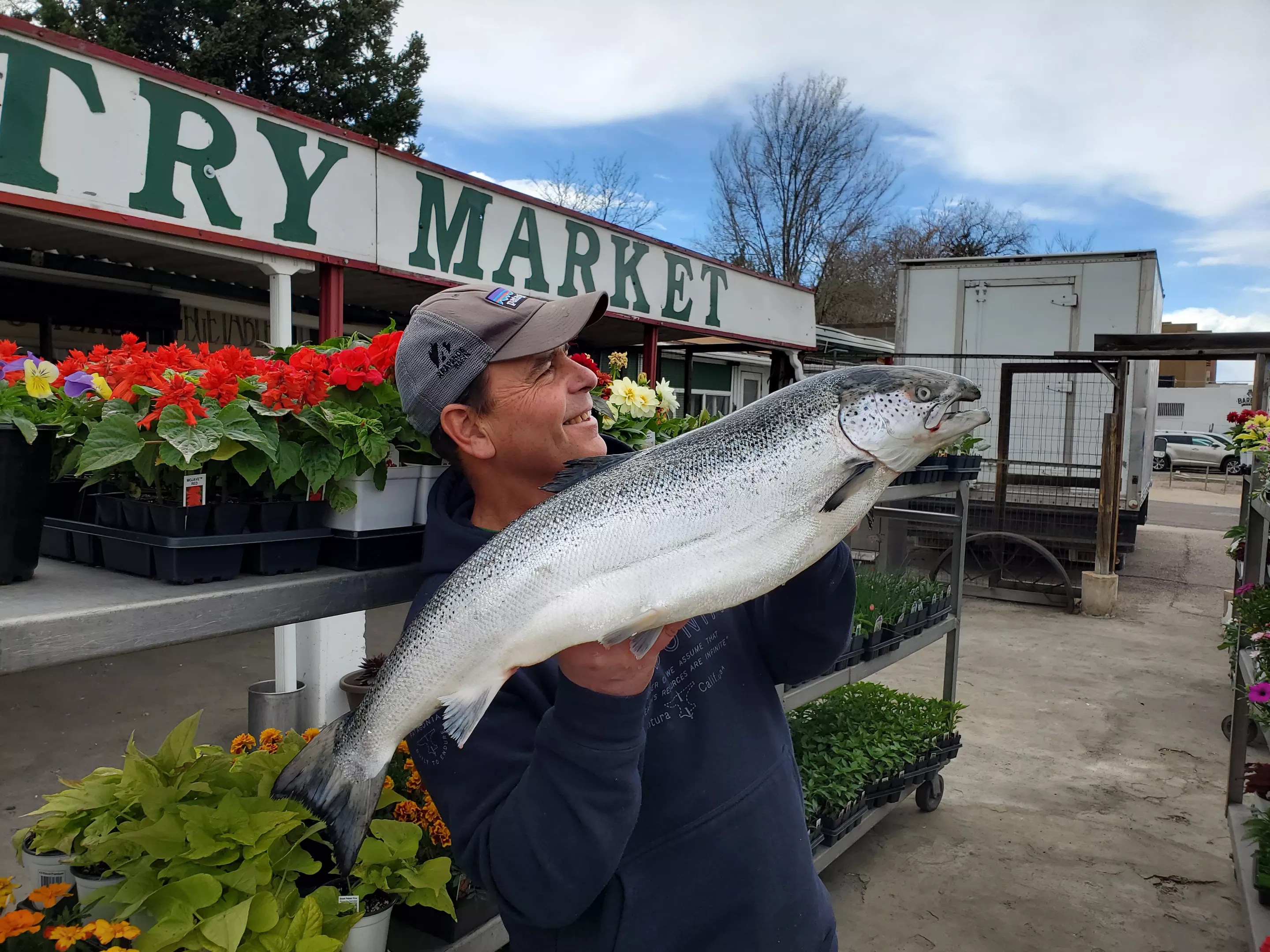
In the summer, it’s all about flowers, plants and wild Alaskan salmon at Town & Country.
Molly Martin
Then Fanganello’s businesses, like every other, had to navigate COVID. “That’s really been a transformative situation,” he says. “When that happened, I was doing really good with the wholesale business. We were cranking it out, and it just collapsed. It was otherworldly.”
His daughter came back from college to wait out the pandemic at home. “She was working at the market, and that was a huge change, to have that young, female energy,” he recalls. She implemented some new ideas, like offering pre-made poke bowls, which customers loved.
In the midst of the lockdown, one Town & Country regular posted on Next Door, encouraging people to support the struggling market. “They heard, and they came in,” Fanganello says. “We had all these new customers. I was tripping out! We had a line. We had a line at Town & Country!” While the line eventually disappeared, the business had been reinvigorated.
Although Fanganello’s fish adventures began in Alaska, he hadn’t been on a commercial fishing trip there for three decades when an old friend called last year. “He said, “My son-in-law is going to run my sister ship. Will you go on the boat with him? He hasn’t fished a lot. Will you go show him how to fish?'” Fanganello recalls. “I was like a veteran greenhorn, and it was scary to think about.”
He couldn’t pass up the opportunity, though. So in June, “I got on a plane and flew up,” he says. “I remember landing in the little airplane on the dirt runway and getting trucked out in the back of the pickup truck. There’s a big bulkhead that they’ve built since I had been there, and I looked over the side, and the tide was low and the boats were like 35 feet down there. ‘Here’s the ladder. Take the ladder,’ they said. And I was like, ‘Holy fucking shit.'”
But he climbed down the old, rusty ladder, “to these little tiny boats in this giant ocean,” he recalls. “I got onto the boat and I met the kid and I saw my friends. We untied the lines, we went out onto the fishing grounds, and the kid was like, ‘What am I supposed to do?’ I told him, ‘Put the wind on the right side of your cheek and head that way.’ And we went out on the grounds, and I knew what I was doing.”
One near-death experience later – on a day so good that the boat was overloaded with fish when the weather suddenly turned – he wrapped up the 28-day-long adventure. Fanganello isn’t sure that he’ll ever go fishing for the season again – “It gets so sketchy sometimes,” he admits – but he’s hooked on Town & Country. “I think it will become world-famous, like Casa Bonita,” he jokes.
While some things at the market have changed in the past few years, many haven’t. The plants are out for spring now, and customers stop by, grab plastic trays and load them up with herbs and tomatoes and chiles for their gardens. Inside, scallops and tilapia are stocked in a refrigerator that now also holds ground yak, raised by the father of a customer who started a farm in Crested Butte.
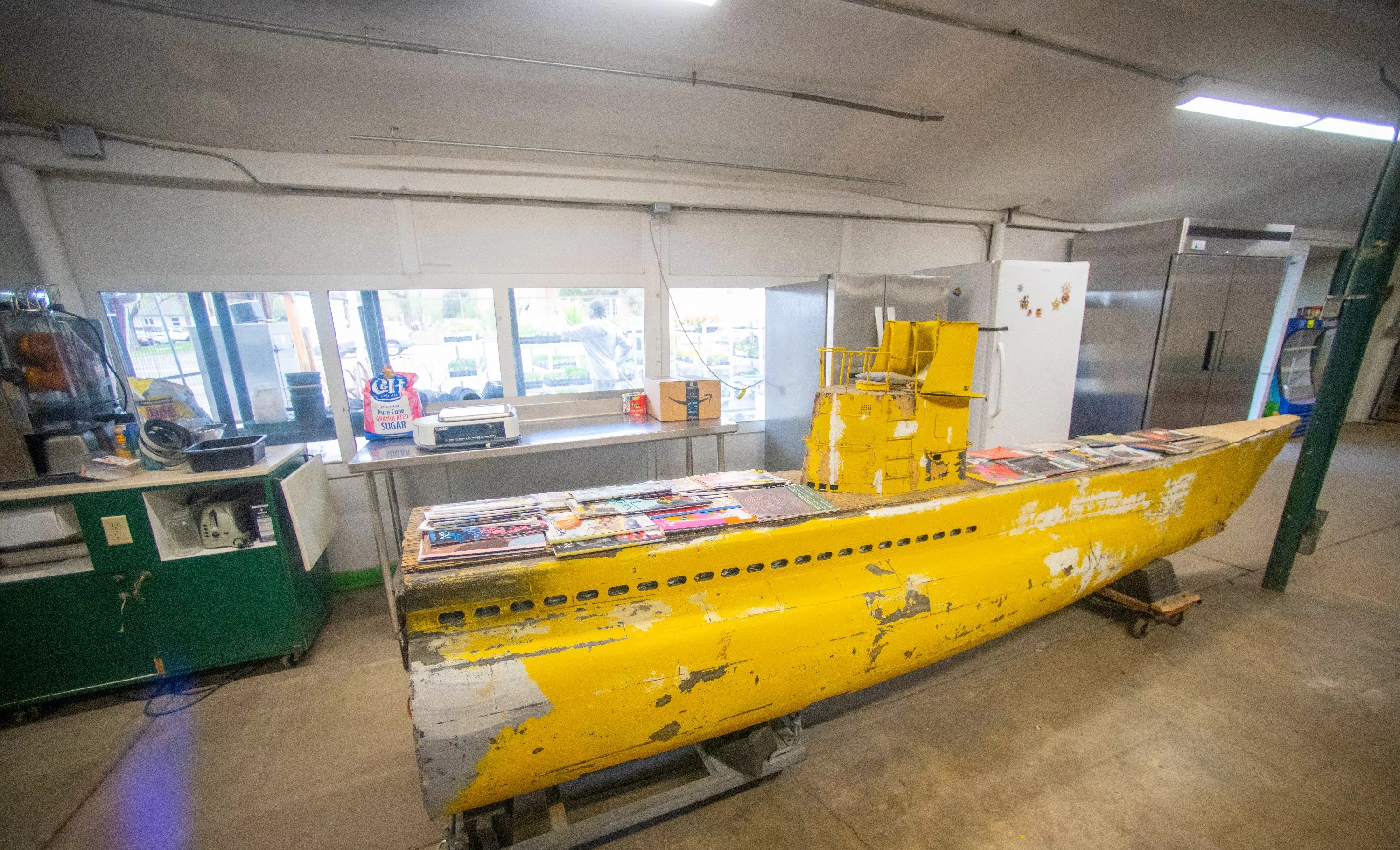
The yellow submarine may move outside the store….some day.
Evan Semón
There’s also a yellow submarine in the middle of the store – not a reference to the market’s fleeting Beatles-adjacent moment, but a remnant of the Armory in Greeley. “When the bar went out of business, it was being auctioned off,” Fanganello says. “I was like, ‘This the only chance you’re gonna have to own a submarine.’ It’s been there for fifteen years, in the way of everything.”
These days, it’s covered with his dad’s copies of the New Yorker. “Someday I’ll probably find a way to put it outside, and Town & Country will become the place with the yellow submarine,” he adds.
In a mostly empty display case, there’s a sign that reads, “Everything on this shelf $2,” near a random mishmash of items that includes a can of black beans, two bottles of Heinz 57 and pre-made margarita mix.
The biggest changes have been in the fish business. “I’m pretty aware of the sustainability aspect, and that we try to keep the lowest carbon footprint that we can, which means you get the fish from as close to you as you can, and you keep it in the ground as much as you can,” Fanganello explains.
Sustainable fishing involves a complex collection of factors, from climate change to over-fishing to farmed fish, and he considers them all. “I’m the number-one guy that doesn’t want to lose the fish,” he says. “That’s my biz. We need the fish. We’re all worried about it.”
Today, he adds, “we work with Alaskan fishers and wild fisheries in the summer, and then we work with ocean-based fish farms in the winter,” all of which are sources he’s built relationships with over the decades.
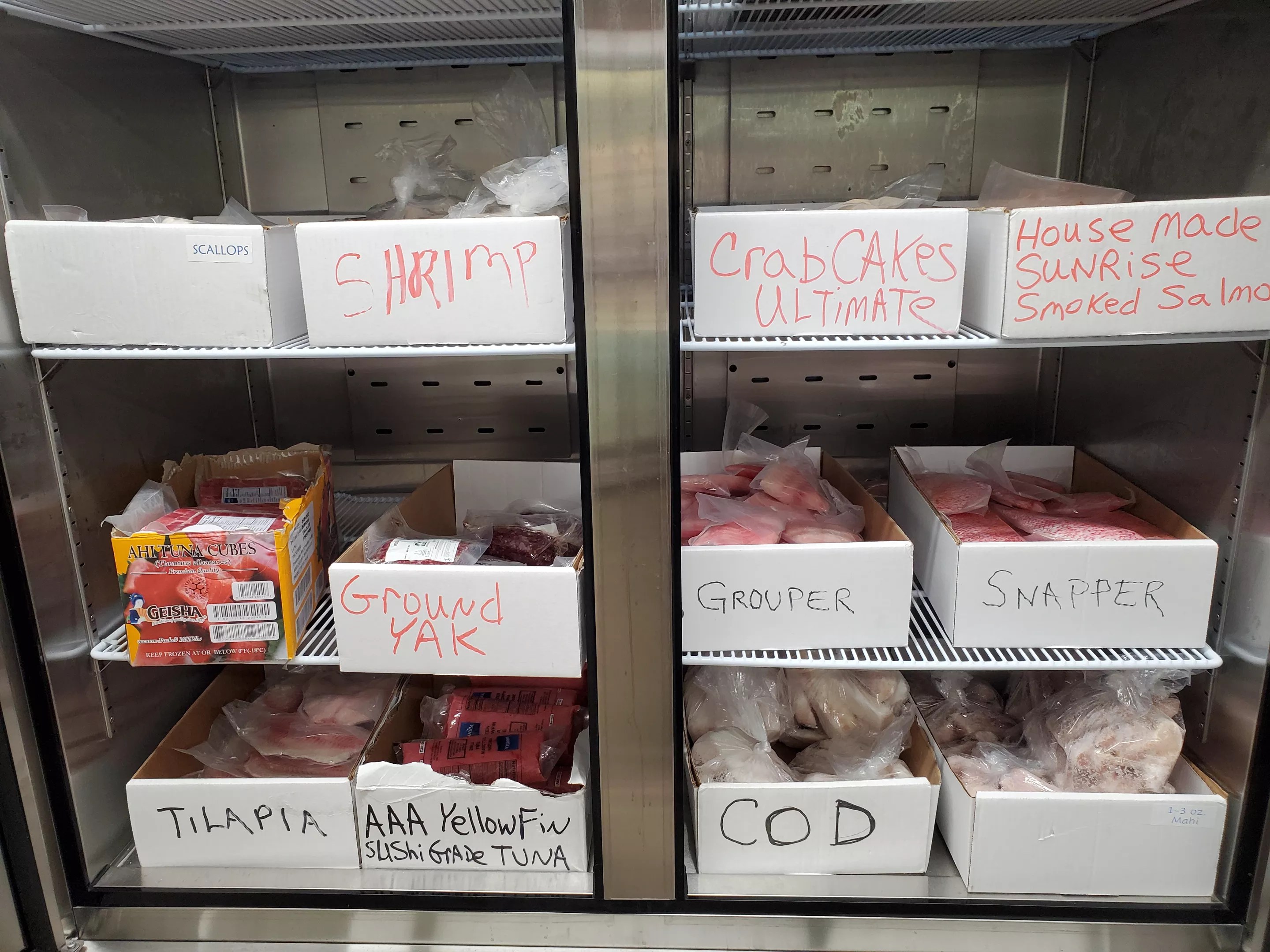
Smoked salmon is sold alongside ground yak at Town & Country.
Molly Martin
“I think that it’s important to have a knowledgeable fishmonger who can keep you pointed in the right direction of sustainability and wholesomeness,” he says. “Fish that is going to be available next year and the year after and the year after, that is fresh, that you can afford.”
He’s been that fishmonger for so many years, even as other local, independent fish companies have been bought out by bigger outfits. “They call, but I hide,” Fanganello says.
“There were some rough, rough years,” he admits. “Cancer, divorce, the economy. I was ready to quit at times. But it’s all about perseverance. It’s a small miracle for this little place to be able to sustain itself.”
And Town & Country is poised to continue into the future, possibly with his daughter, who is graduating from college this spring, at the helm one day. “I feel like I’ve created the foundation. I’ve got the property, I’ve got the adjacent property, I’ve held on to the liquor license,” Fanganello concludes. “I think it’s cool to keep doing what we’re doing. You want some collard greens? We’ve got some collard greens. You want salmon? We’ve got salmon. But it would be cool to add some more, too. Like, you want some beer? We’ve got some beer…”
Town & Country Market and Alaskan Salmon Company are located at 4300 East Colfax Avenue and open from 9 a.m. to 5 p.m. daily. For more information, visit alaskansalmon.com.